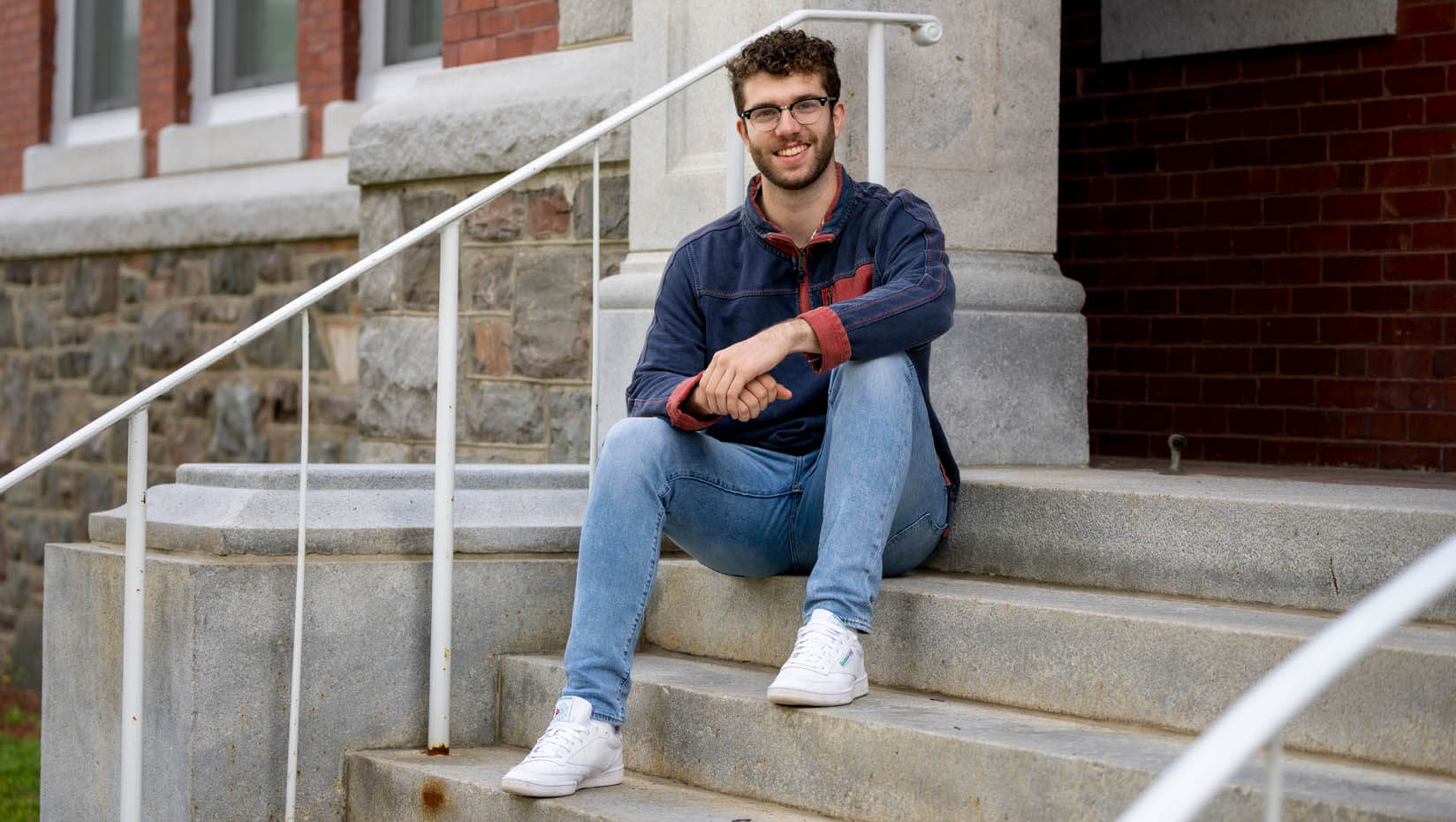
Michael Delorge: Researching recovery
Michael Delorge may only be in his third year at the University of Maine, but he is already making waves in the world of public health. Delorge will present research about substance use disorder recovery in Maine that he conducted with his peers through a UMaine political science class at the Maine Public Health Association’s annual conference in October — and he’s just getting started.
Delorge was born and raised in Biddeford, Maine. While he was in high school, he was sure that he wanted to pursue a career in medicine, but once he got to college and started his major in biology, he realized that going to medical school wasn’t his dream. It wasn’t that Delorge didn’t find biology interesting. He simply found a new passion: political science.
Delorge recalled participating in Maine Youth in Government in high school, and the thrill of playing legislature and passing mock legislation with his peers. He took professor Rob Ballingall’s class in political theory his freshman year as “filler” between his biology courses and unintentionally fell in love. He also joined the UMaine Student Voting Ambassadors program during his first year to make friends while trying to navigate college during the pandemic, but wound up developing a mentorship relationship with Rob Glover, associate professor of political science, whose work studying policy fascinated Delorge.
At the end of his freshman year, Delorge received an email about an upcoming practicum Glover was teaching in engaged policy research.
“I changed my whole schedule around to take that course because I was so excited about it,” Delorge says.
The yearlong class involved a group research project grounded in helping the community, including by partnering with a local organization. His group decided that they were going to look at drug policy and teamed up with Courtney Allen, policy director at the Maine Recovery Advocacy Project (ME-RAP). With Allen’s guidance, the group of undergraduates created a 75 question survey that they distributed to people in long-term substance use recovery statewide. Allen was able to leverage her network to distribute the survey, but the students also got creative with recruitment; Delorge even appeared on a radio show to try and recruit more participants from a key demographic group that they were missing.
Delorge says that “around two-thirds” of their survey replicated a 2013 survey conducted by the organization Faces and Voices of Recovery looking at the experiences of long-term recovery, asking questions about demographics and how being in recovery versus actively using impacted an individual’s lifestyle. The final portion of the survey, though, asked for participants’ opinions about Maine’s proposed drug policies — for example, establishing safe injection sites, permitting involuntary commitment of loved ones to treatment centers or even creating a recovery ally license plate for the state.
Delorge says that the research was enlightening. For example, it showed that Mainers were three-and-a-half times less likely to be arrested in recovery than during active addiction. Seventy-four percent of Mainers in recovery described themselves as “steadily employed” whereas only 49% said the same during their period of active addiction. Only 53% of those surveyed agreed that a process should exist for involuntarily committing a loved one to a treatment program. Meanwhile, 87% agreed that Maine should expand its Good Samaritan law to include everyone at the scene of an overdose; the students’ research informed efforts to educate lawmakers about the recovery community’s support for the bill, and it passed in April 2022.
Delorge has been able to forge a path for himself in public health even beyond his research. In May 2022, he participated in a Partners for World Health medical mission trip to Senegal. Delorge also joined the Maine Public Health Association (MPHA) as a student member through the advice of UMaine alumnus Jay Knowlton, who he met through Crisanne Blackie at the UMaine Career Center.
Delorge jumped into his MPHA membership, participating in the MPHA mentor program and the Alcohol, Tobacco and Other Drugs member section. When the MPHA asked for research presentation proposals for their annual conference, which will be themed “The Role of Public Health in Strengthening Maine’s Communities,” Delorge applied using the research he conducted with his peers through Glover’s class.
It was accepted and he will be presenting at the MPHA annual conference this October.
“I’m hoping for some practical experience in preparing myself for public speaking,” Delorge says. “I presented at the UMaine Student Symposium this past year but this will get me out of my comfort zone a little bit and will hopefully help me make more connections in public health.”
This summer, Delorge also has been working as a policy intern at the Maine Medical Association with its director of communications and government affairs, which has opened his eyes to different aspects of the public health world.
“I’ve been assisting in a lot of their government affairs work in health care, so maybe getting into lobbying is something that I’m interested in, but continuing advocacy work is also exciting,” Delorge says.
For this upcoming year, Delorge has received funding from the Margaret Chase Smith Policy Center to continue his own research with the data set collected through Glover’s engaged policy practicum. Delorge plans to study the demographic factors that most notably contribute to success in recovery. He hopes to present his early findings from this research at the MPHA conference in October, too.
“Michael [Delorge] is a truly exceptional student and researcher,” Glover says. “The work he is currently doing as an extension of [his] project will enrich our understanding of what facilitates individuals with substance use disorder on their road to recovery. More importantly, it will help us better understand how to support those in recovery via targeted public policy interventions.”
Contact: Sam Schipani, samantha.schipani@maine.edu
